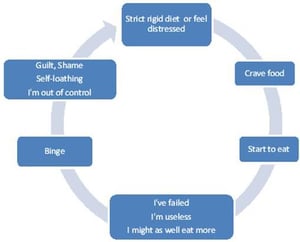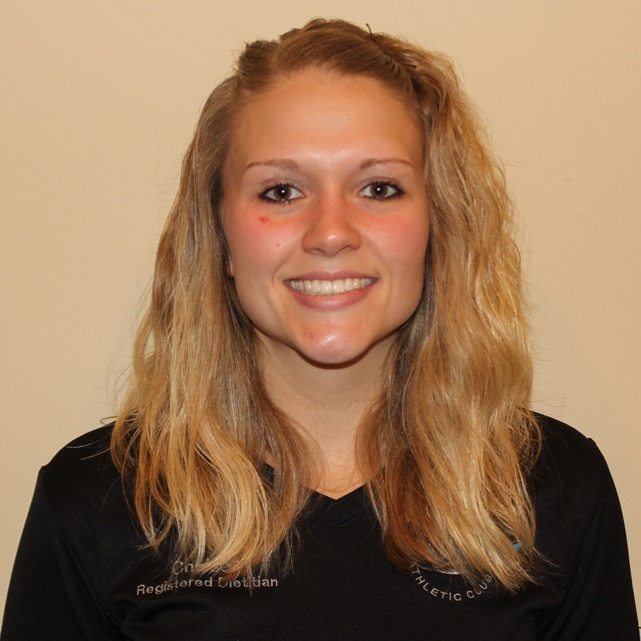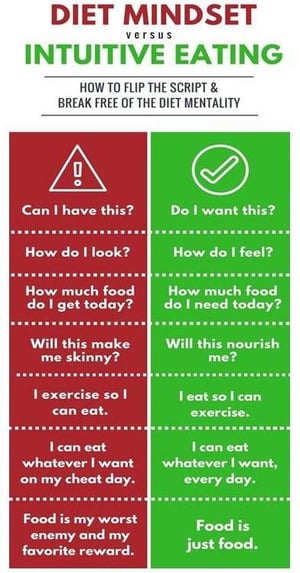Why You Need to Ditch the Diet
Posted by Chelsey Hegge on August 28, 2018
Imagine a different approach to a healthier lifestyle, one that doesn’t include restricting various food groups or your calories to a point where you are hungry all of the time.
Imagine enjoying food experiences and honoring your body’s hunger/needs and moving your body for enjoyment versus punishment. This approach to living a well-balanced, healthy lifestyle can be achieved without going on a diet.
Ketogenic, Atkins, Whole 30, Jenny Craig, Nutrisystem, South Beach, SlimFast, Medifast and Paleo are just a few of the diets out there that promote quick weight loss to help one reach their desired weight loss goals. Americans are dieting at the highest rate in history with an estimated 45 million Americans going on a diet each year. Approximately “… 20-24% of American men and 33-40% of American women are actively dieting to lose weight.”
These statistics reflect our society’s pressure to begin a diet due to the belief that something is wrong with our bodies. There is no harm in having the desire to get into better shape to feel healthier and have more energy, however, it should develop out of self-love and be accompanied by healthy lifestyle changes versus another diet. Diets are not long-term. They fail people 95% of the time and often damage one’s relationship with food.
Reasons to ditch the diet for good:

- Most diets are very restrictive, even to the point of cutting out essential food groups, which can lead to nutrient deficiencies as key nutrients are excluded from the diet.
- Diets lead people to start classifying foods as “good” or “bad,” which can negatively impact one’s relationship with food.
- After a period of restriction, one may start to feel deprived and experience cravings and an increased preoccupation with food because the body associates dieting with a form of starvation.
- As the body’s natural response to starvation one eventually gives in to overeating the “bad” foods. This can promote feelings of guilt, shame and failure instead of recognizing that diets are actually failing those who engage in dieting behaviors. This feeling of failure prompts one to start another restrictive diet with the hope that one might be successful during the next attempt.
- Diets are impossible to adhere to long-term and many people who start a diet rarely maintain their weight loss and sometimes even gain more weight back than they had lost.
- Chronic dieting decreases one’s metabolism, slows the rate of weight loss with each successive attempt, and causes one’s satiety cues to atrophy.
- Chronic dieting can result in weight cycling, disordered eating, low self-efficacy, depression and lower self-esteem.
Alternative to dieting:
- Adopt a healthy lifestyle pattern that one can maintain long-term. This could include seeking a Registered Dietitian’s help to learn about portion sizes, meal timing, components of well-balanced meals and snacks, as well as determining one’s nutritional needs.
- Become attuned to one’s internal cues, such as hunger and satiety, and honoring hunger signals with a variety of nutrient-dense foods (fruits, vegetables, whole grains, lean meats, low-fat dairy and healthy fats). This eating pattern of learning to respond to inner body cues is known as intuitive eating/mindful eating. This approach teaches one how to create a healthy relationship with one’s food, mind and body.
- Shift away from labeling foods as “good” or “bad” and understand that all foods can fit into a healthy lifestyle in moderation.
- To achieve a more balanced lifestyle one can practice the 80/20 rule, in which one consumes nutrient dense foods 80% of the time while allowing oneself to indulge intuitively the other 20% of the time. This will prevent the restriction => overeating => feelings of guilt/failure cycle as described above.
- Instead of engaging in physical activity to “burn off” the calories eaten the day before, begin to incorporate physical activity that is enjoyable so that physical activity can be maintained in the long run. Take the focus off of the calorie-burning effect of exercise and begin to notice the positive benefits (such as being more energized) that occur after moving in an enjoyable way.
A healthy lifestyle is not about being perfect 100% of the time with food and exercise, nor is it about restriction.
It is about finding a balance in nutrition, physical activity and enjoyment in life. Achieving a healthy lifestyle is learning to let go of the diet mentality and beginning to honor one’s hunger, respecting one’s fullness, enjoying a variety of nutritious foods, engaging in joyful movement, and shifting one’s focus to self-care instead of restriction.
If you would like additional help in learning about a more balanced approach to nutrition and physical activity please contact one of the Registered Dietitians here at the RAC: Chelsey Kruger at ckruger@racmn.com or Branda Anderson at banderson@racmn.com.
References:
- Johnson, R. What is a Non-Diet Approach? Am I Hungry? Accessed August 3, 2018.
- Taylor, AP. Ready to Say Goodbye to Dieting? University of Utah Health. Published April 12, 2018. Accessed August 3, 2018.
- The Non-Diet Approach. University of New Hampshire Health & Wellness. Accessed August 3, 2018.
- Weight Management. Boston Medical Center. Accessed August 3, 2018.

Chelsey Hegge
Chelsey Hegge, RD LD, ACE-CPT has a BS in Community Medical Dietetics. She has a passion for health and enjoys assisting people in leading healthier lifestyles by focusing on creating healthy and sustainable long-term habits while incorporating a balanced diet where all foods fit in moderation. Chelsey enjoys being active through lifting weights, walking and has completed several half marathons. In her free time you will find her trying new recipes, hanging out with friends and family, and spending time outdoors.
Contact Chelsey Hegge at (507) 287-9335 ext. 355.




